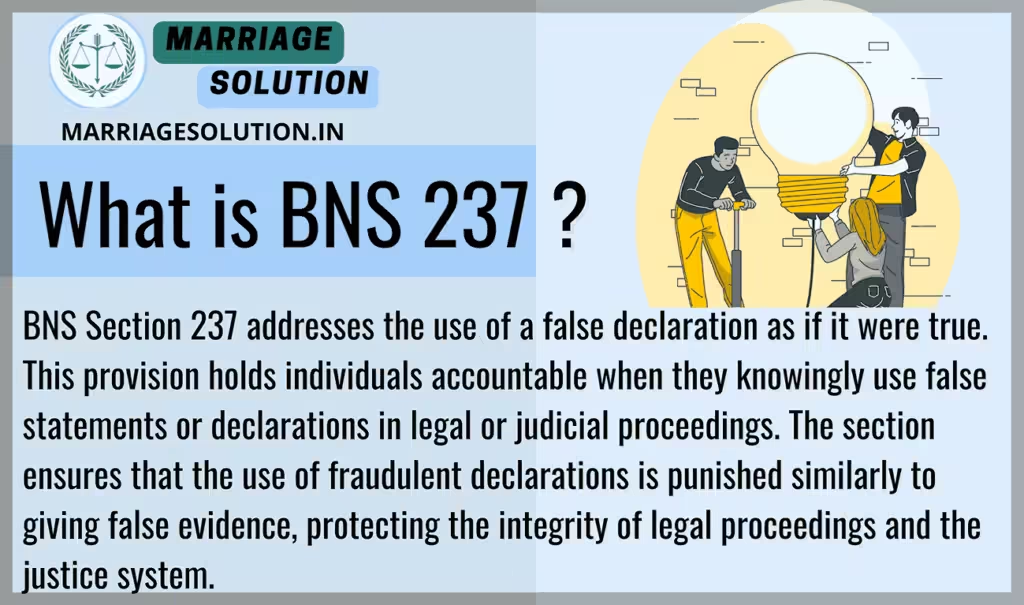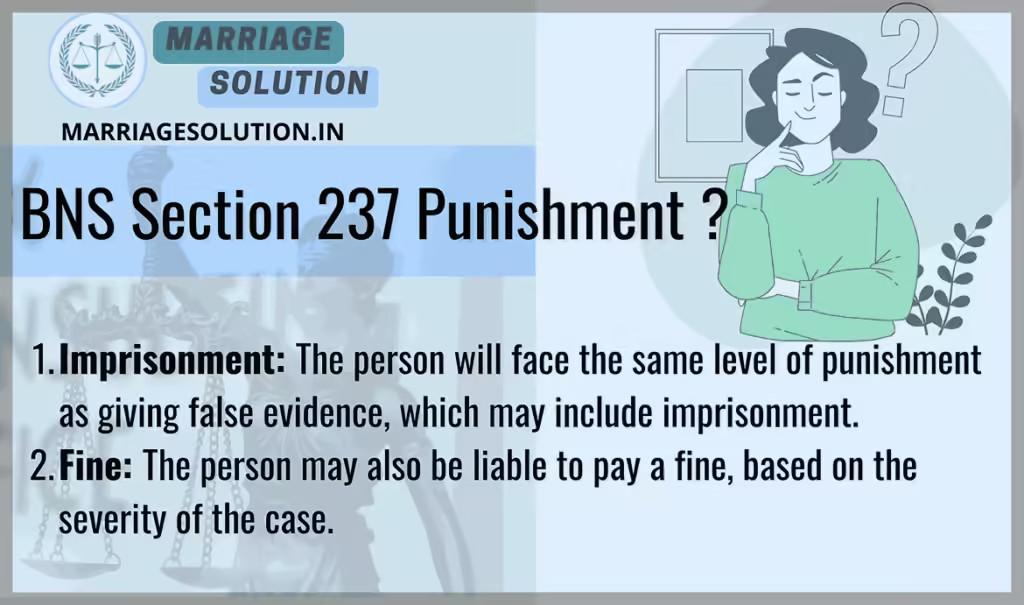Introduction of BNS 237
BNS 237 of the Bharatiya Nyaya Sanhita, 2023 deals with the serious offence of using or attempting to use a false declaration as if it were true. A declaration is a legal statement accepted as evidence in court or by a public authority. This section ensures that no one can misuse fraudulent declarations to deceive the judicial system. By punishing such acts with the same penalties as giving false evidence, the law safeguards the integrity of legal proceedings and prevents manipulation of justice.
The Bharatiya Nyaya Sanhita (BNS) Section 237 replaces the old Indian Penal Code (IPC) Section 200.
What is BNS Section 237 ?
BNS Section 237 deals with the crime of knowingly using a false declaration as if it were true. If a person corruptly uses or attempts to use a false statement or declaration in a legal setting, knowing it is false in a significant way, they will face the same punishment as someone who gives false evidence.

Under Section 237 of the bns act 2023
“Whoever corruptly uses or attempts to use any such declaration, knowing the same to be false in any material particular, shall be punished in the same manner as if he gave false evidence.”
1. Meaning of “Using a False Declaration”
- A declaration is a formal statement, affidavit, or certificate which is legally receivable as evidence.
- Under this section, if a person knowingly uses a false declaration as true, they are guilty of the offence.
- The law does not just punish the person who created the false declaration (covered in BNS 236) but also anyone who knowingly uses it to deceive the court or legal authority.
2. Who is Covered?
This section applies to:
- Individuals submitting declarations in court cases.
- Litigants or parties who knowingly use false affidavits, property papers, or certificates.
- Witnesses who present false written statements or documents as if they were genuine.
3. Nature of the Offence
- Non-Cognizable → Police cannot arrest without a warrant.
- Bailable → Accused has the right to bail.
- Non-Compoundable → Cannot be privately settled; must be decided by the court.
- Triable by Court handling false evidence cases → Heard in the same courts that deal with perjury and false evidence.
4. Examples of BNS Section 237
Example 1 – False Witness Declaration
A man produces a declaration in court claiming he saw the accused at the crime scene, even though he knows this declaration is false. By using it as true, he commits an offence under Section 237.
Example 2 – Fake Property Certificate
During a property dispute, a party submits a false ownership certificate knowing it is fabricated. By attempting to pass it off as genuine, they are guilty under this section.
Example 3 – Not Guilty Case
If a person unknowingly uses a declaration they believed to be genuine, but later it turns out to be false, they are not guilty under Section 237. The law requires knowledge of falsity.
5. Punishment under BNS Section 237
- Imprisonment → Same as for giving false evidence (duration depends on sev
- rity and context).
- Fine → May also be imposed.
- Both → In serious cases, imprisonment and fine together.
6. Importance of BNS Section 237
- Prevents misuse of fraudulent declarations in judicial and official matters.
- Ensures that only truthful evidence is relied upon in courts.
- Protects innocent people from being falsely implicated through forged declarations.
- Strengthens the credibility of justice system by punishing both creators and users of false declarations.
Section 237 BNS Overview
BNS Section 237 makes it an offence for anyone to knowingly use or attempt to use a false declaration in legal matters, treating it as if it were a genuine declaration. The section emphasizes that using such false statements knowingly is punishable by law, equivalent to the punishment for giving false evidence.
10 Key Points of BNS Section 237
- Using False Declarations as True:
- BNS Section 237 applies when someone corruptly uses a false declaration, knowing it is not true, and tries to pass it off as a legitimate statement in legal matters.
- Intent and Knowledge:
- For a person to be guilty under this section, they must knowingly use the false declaration with the intent to deceive or mislead. This means the person is fully aware that the statement is false but uses it anyway.
- False Declaration’s Materiality:
- The declaration must be false in a “material point.” This means the false information should be significant and relevant to the case or issue at hand, not just a minor error.
- Punishment Equivalent to Giving False Evidence:
- The punishment for using a false declaration is the same as for giving false evidence. This can include imprisonment or fines, depending on the severity of the false statement and its impact on the legal proceedings.
- Explanation of “Declaration”:
- A declaration is an official statement given in legal proceedings that is accepted as evidence. Even if the declaration has a minor formality issue, it still falls under this section if it is used with the intent to deceive.
- Cognizable vs. Non-Cognizable:
- This offence is classified as non-cognizable, meaning the police cannot arrest the accused without a warrant. It involves a court process before any direct legal action is taken.
- Bailable Offence:
- BNS Section 237 is a bailable offence, meaning the accused person can secure bail and avoid staying in custody until the trial.
- Non-Compoundable Offence:
- The offence is non-compoundable, which means it cannot be settled outside of court through mutual agreement. The case must go through the court trial process.
- Court for Trial:
- The trial for this offence is held in the same court that handles cases involving false evidence. This ensures that the judicial process treats this offence with the same seriousness as other false evidence cases.
- Protection of Judicial Process:
- The intent of this section is to safeguard the integrity of legal proceedings. By punishing individuals who knowingly use false declarations, it ensures that the judicial system remains just and free from fraudulent actions.
Examples:
- Example 1: A person submits a declaration in court, stating that they witnessed an incident, but they know that the statement is false. If they use this declaration as if it is true, they are guilty under BNS Section 237.
- Example 2: Someone submits a false certificate regarding property ownership in a land dispute case, knowing it to be false, but still uses it as evidence. This would be a violation of BNS Section 237.
BNS 237 Punishment
Imprisonment: The person will face the same level of punishment as giving false evidence, which may include imprisonment.
Fine: The person may also be liable to pay a fine, based on the severity of the case.

BNS 237 bailable or non bailable ?
BNS Section 237 is a bailable offence. This means that a person accused under this section has the right to seek bail and can be released from custody while awaiting trial.
Comparison Table: BNS Section 237 vs IPC Section 200
| Section | What it Means | Punishment | Bail | Cognizable? | Trial By |
|---|---|---|---|---|---|
| BNS Section 237 | Covers anyone who uses or attempts to use a false declaration as true, knowing it is false in a material point. Treated as giving false evidence. | Same punishment as for giving false evidence — imprisonment, fine, or both (based on seriousness). | Bailable | Non-Cognizable | Court that tries false evidence offences |
| IPC Section 200 (Old) | Dealt with anyone who used a false declaration as true, knowing it was false in any material particular. Considered equivalent to giving false evidence. | Same as giving false evidence under IPC — imprisonment and/or fine depending on the nature of the false declaration. | Bailable | Non-Cognizable | Court competent to try false evidence cases |
| Key Difference: BNS 237 replaces IPC 200 with updated and clearer wording, ensuring that false digital or electronic declarations are also punishable. Both have identical punishment and nature, but BNS 237 broadens scope to cover modern evidence formats and simplifies legal interpretation. | |||||
BNS Section 237 FAQs
What is the purpose of BNS Section 237?
It aims to punish individuals who knowingly use false declarations as if they were true in legal proceedings, thus maintaining the integrity of the justice system.
Is BNS Section 237 a bailable offence?
Yes, it is a bailable offence, allowing the accused to obtain bail and avoid pre-trial detention.
What is the difference between giving false evidence and using a false declaration?
Giving false evidence involves making false statements directly in court, while using a false declaration refers to using a previously created document or statement as if it were true.
What are the legal consequences of being convicted under BNS Section 237?
The person faces the same punishment as for giving false evidence, which can include imprisonment and fines.
Can this offence be settled outside court?
No, this offence is non-compoundable, meaning it cannot be resolved outside of the judicial system through mutual settlement.
Conclusion
BNS Section 237 plays a vital role in protecting the credibility of the justice system. It not only punishes those who create false declarations but also those who knowingly use them to mislead courts or authorities. By equating the offence with giving false evidence, the law ensures strict accountability, deters fraudulent practices, and promotes fairness in judicial proceedings. For students, professionals, and legal practitioners, understanding this section is essential to grasp how the law combats dishonesty in evidence and maintains trust in legal processes.
Need Legal Support?
If you are dealing with court cases, marriage problems, or any other legal issue, our team at Marriage Solution – Lawyer Help is here for you. Simply fill out our quick online enquiry form, and we’ll connect you with the right legal expert to support your needs.
Finished with BNS 237 ? Continue exploring the next provisions of the Bharatiya Nyaya Sanhita (BNS), 2023. Each section includes explanations, examples, and plain-language breakdowns for easy understanding.
- 238 BNS : Hiding or destroying evidence of a crime, or giving false information to protect the criminal.
- https://marriagesolution.in/bns_section/238-bns/
- 239 BNS : Intentional omission to give information of offence by person bound to inform.
- https://marriagesolution.in/bns_section/239-bns/
- BNS 240 : Giving false information respecting an offence committed.
- https://marriagesolution.in/bns_section/bns-240/
- 241 BNS : Destroying a document or electronic record so that it cannot be used as evidence in a case.
- https://marriagesolution.in/bns_section/241-bns/
- 242 BNS : False personation for purpose of act or proceeding in suit or prosecution.
- https://marriagesolution.in/bns_section/242-bns/
Full IPC Section List: https://marriagesolution.in/ipc-section-list
All Indian Law & Blogs: https://marriagesolution.in/indian-law/
Full BNSS Section List: https://marriagesolution.in/bnss_section-list
